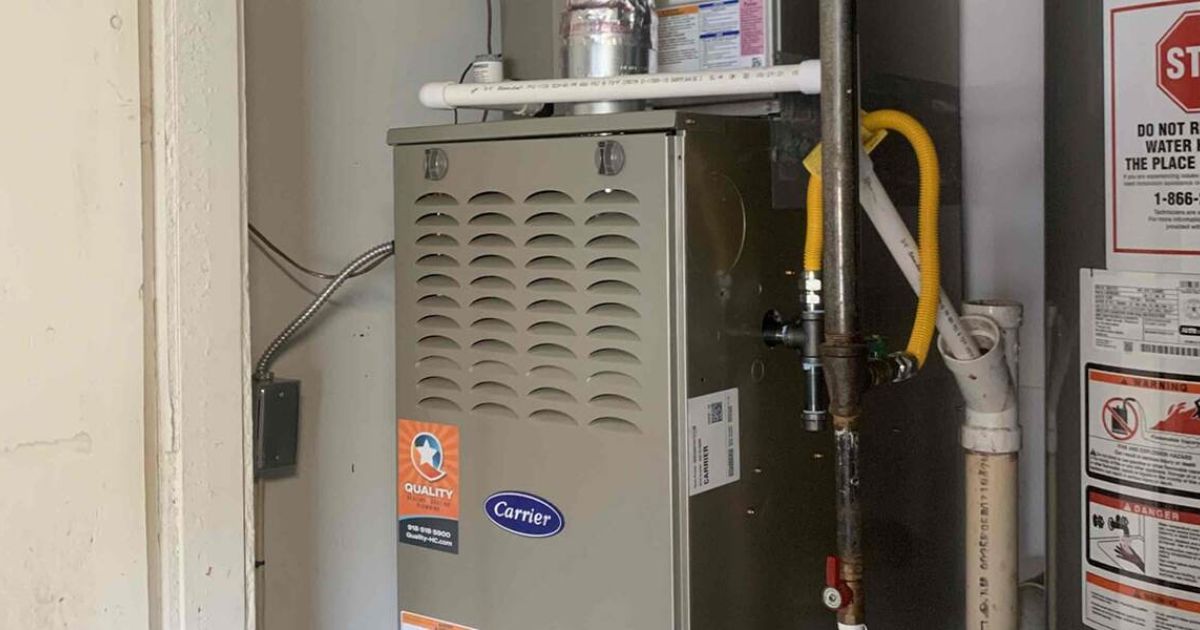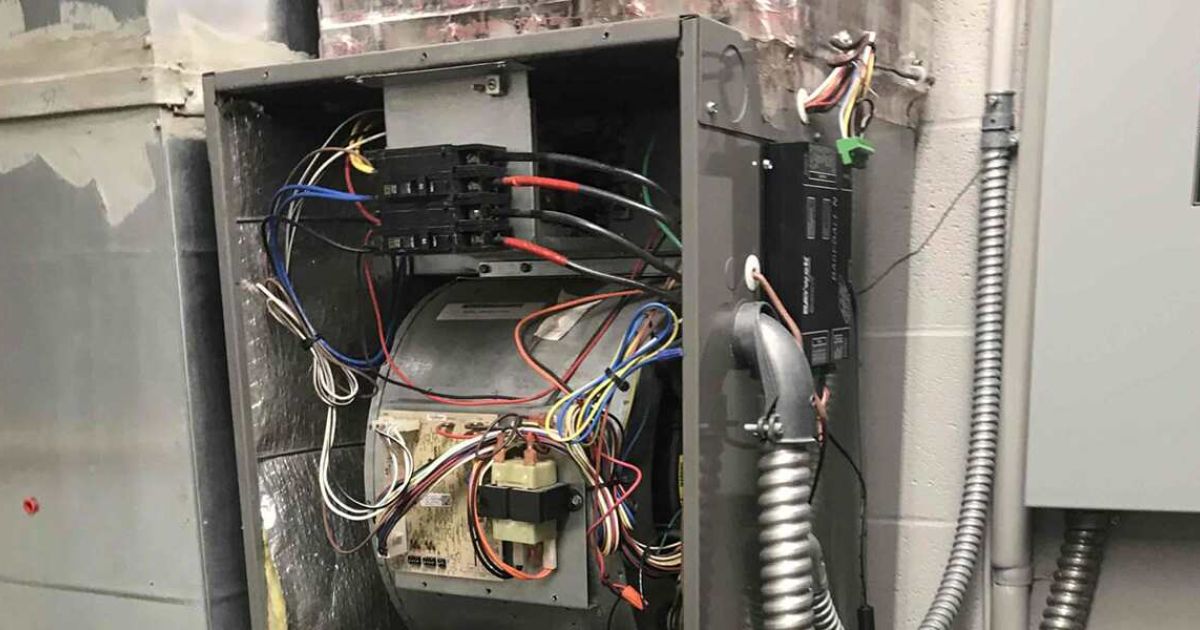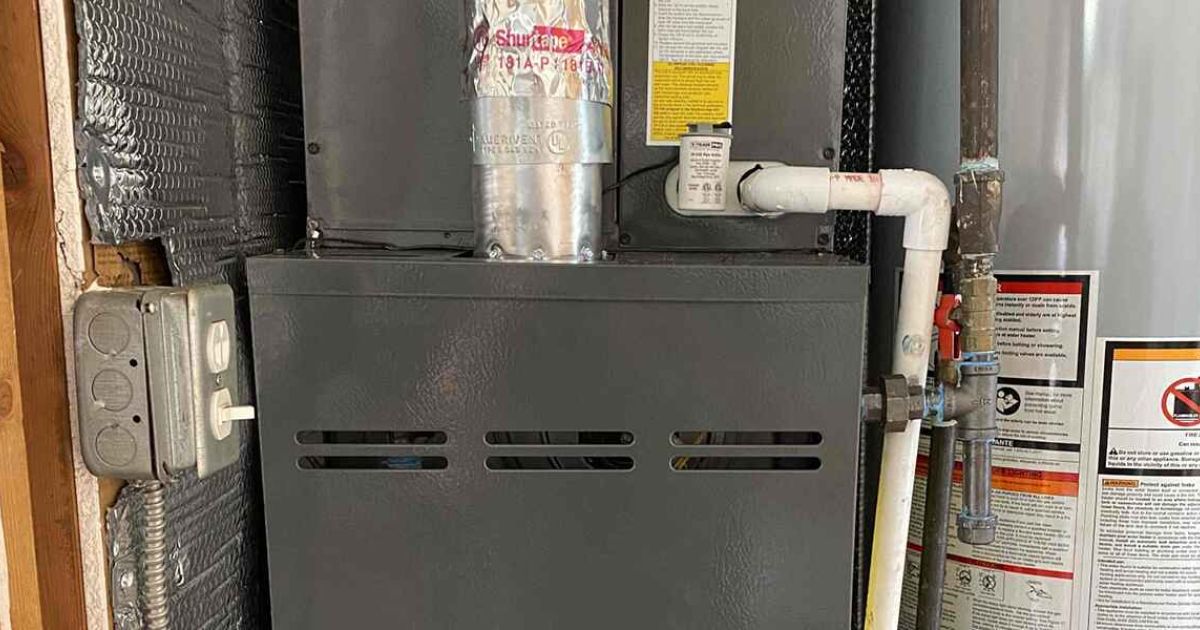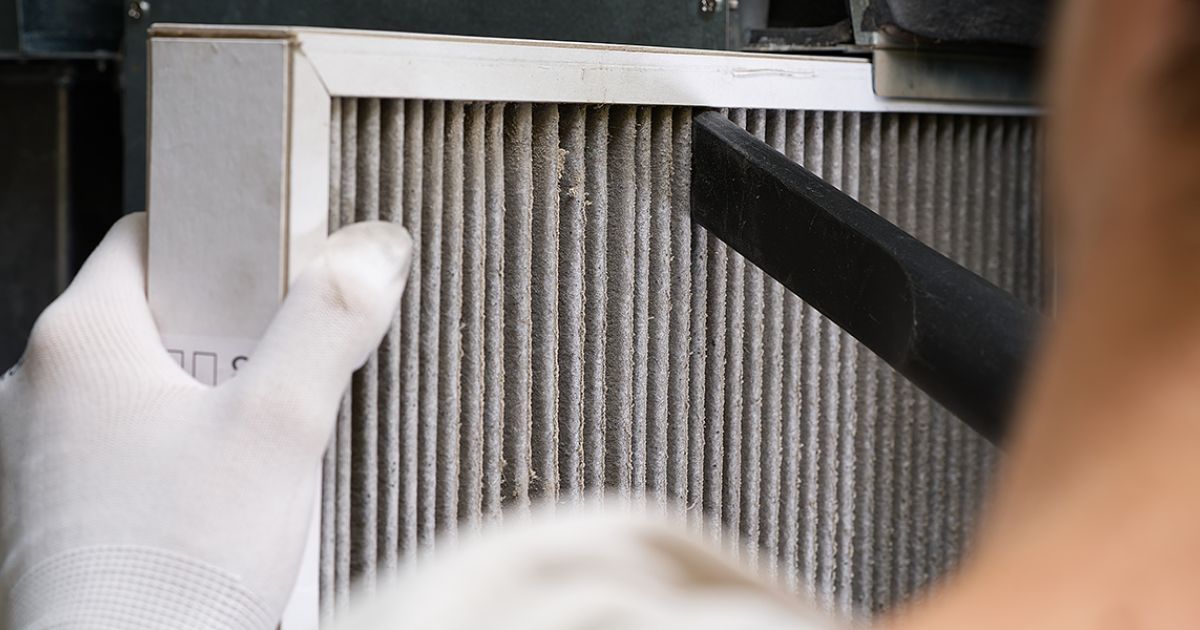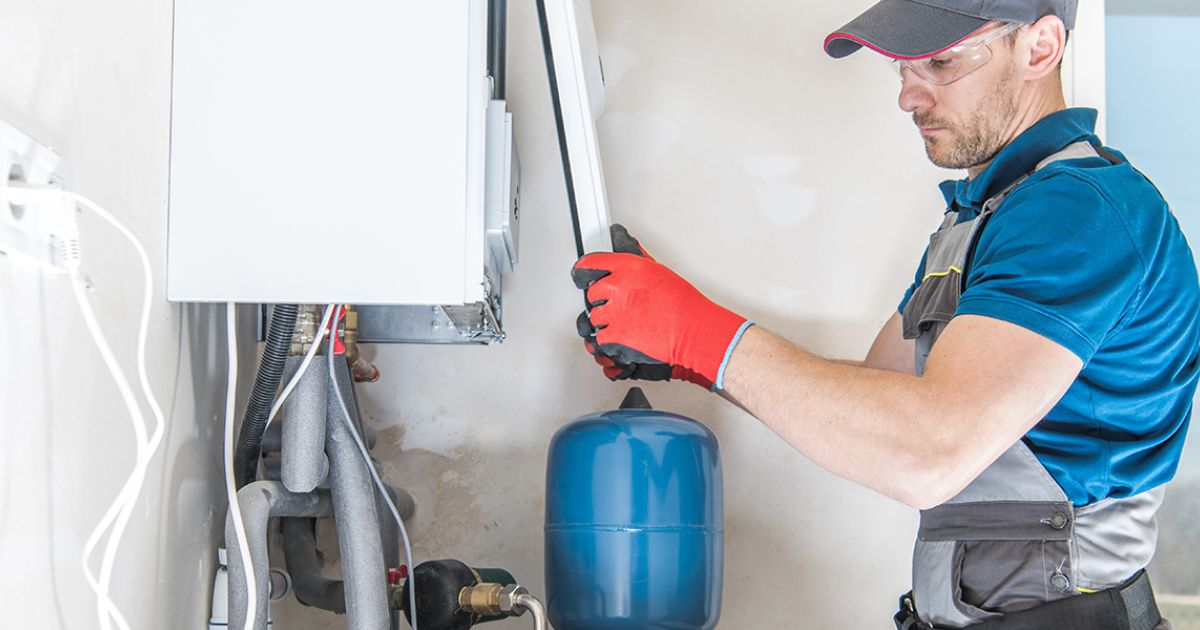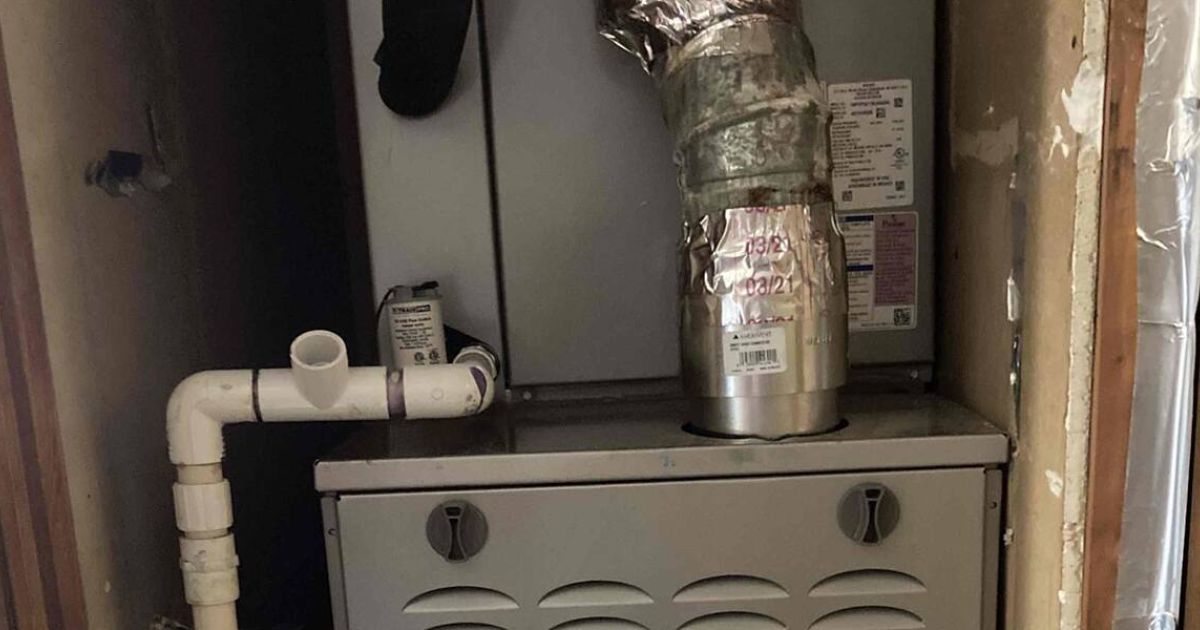
Many home heating systems, such as boilers and radiators, use water to heat homes. But what about furnaces? Does a furnace need water to run?
The answer is no; furnaces do not need water to run. However, furnaces can still produce water through combustion condensation. The team at Quality Heating, Cooling & Plumbing is here to discuss furnaces, water, and the relationship between the two.
Contact us today to schedule services for heating and air conditioning in Tulsa!
Do Furnaces Use Water?
Does a furnace need water to run? No. HVAC furnaces do not use water to generate heat. Instead, furnaces heat by burning natural gas. The combustion reaction oxides the natural gas, and the reaction releases heat — no water needed!
On the other hand, boilers and radiators do create heat using water. Boilers heat water and pump them through your home into radiators. The hot water radiates heat, increasing the temperature of your home.
Furnaces don’t have boilers or radiators, so you never have to worry about your furnace running out of water or not having enough water.
Why Does My Furnace Have Water On It?
Furnaces don’t need water to run, but homeowners may notice condensation and moisture around their furnaces over time. If furnaces don’t require water, then where does this water come from?
The answer is combustion. An energy-efficient heating appliance uses a combustion reaction to produce heat, carbon dioxide, and water vapor. The heated vapor condenses when it hits the heat exchange, creating drops of moisture. One main function of furnace vents is to get rid of this moisture.
Clogs in your furnace drain system can cause condensation to leak out of vents and collect on the floor. If you notice water pooling on the floor near your furnace, you should check vents and drain lines to see if there are any leaks or blockages.
Below is a quick list of other reasons your furnace might be leaking water.
Air Conditioning Problems
If your furnace is dripping water, your air conditioning system may be the culprit. In modern HVAC systems, furnaces and air conditioners often share the same cabinet and blower fan. Leaks from your air conditioner can work their way into your furnace, making it appear like it’s your furnace that is leaking.
Broken Condensate Pump
Most furnaces have a special pump that helps drain any condensate it produces. If the condensate pump brakes, water won’t drain properly and may start to leak onto the floor around the furnace cabinet.
Frozen Coils
Modern air conditioners use evaporator and condenser coils to produce cold air. If these coils freeze, they can leak water into your heat exchanger and appear to leak from your furnace. That is why we always recommend getting separate inspections for both your air conditioner and furnace.
Are Boilers or Furnaces Better?
Whether boilers or furnaces are better depends on your specific situation and preference.
Boilers are highly efficient and relatively low maintenance compared to gas furnaces. They also produce fewer emissions and dust than furnaces.
The downsides of boilers are they take longer to heat your home, and installation can be expensive. Boilers may also have difficulties running in cold weather because the water can freeze, and they can spring a leak.
Furnaces are comparatively stronger and heat faster, but they cost more to run. Furnaces can also leak gas, which can pose a health and safety hazard, and also have shorter lifespans than boilers.
Other Heating Systems That Use Water
Boilers are the most common type of heating system that uses water, but others exist. Below are two other relatively common HVAC setups that run on water.
Baseboard Heating Systems
Baseboard heating systems are similar to traditional boiler systems in that they use pipes to pump hot water and steam through your home to distribute heat. The main difference is that baseboard systems don’t have individual radiators but instead use special electric baseboards near the floor.
The steam running through the baseboard radiators heats the air, which then rises to fill the rest of the room. The main downside of this kind of system is that installing the electric baseboards can be difficult.
Radiant Floor Heating Systems
Radiant floor heating systems work like baseboard systems, except they pipe heat through piping underneath the flooring. Homeowners favor this kind of system because it keeps your feet warm in addition to being efficient and low maintenance.
Water Heater vs. Furnaces
Many homes also have a water heater that produces the hot water they use throughout the home. When water heaters leak, homeowners may initially want to call their HVAC company due to the word “heater” in the name.
However, water heaters are not part of your HVAC system but your plumbing system. Water heater repair requires a plumber, not an HVAC technician. An HVAC technician won’t be able to fix your water heater, just like how a plumber won’t be able to fix your furnace.
Is Water on Your Furnace a Problem?
Even if the amount of water is small, it can still be a problem. Water and moisture can damage electrical components, and mold and mildew can start to grow in your duct system. Electrical damage can cause short circuits, which may lead to a fire.
Water leaks from your HVAC system can also damage your home. Water in a crawl space can damage wooden structures, and standing water in your basement can seep into your home’s foundation. Suffice it to say that if you see water pooling around your furnace, you should call an HVAC expert ASAP.
What Should I Do If I Detect Water on My Furnace?
If you do notice water on and around your furnace, the first thing you should do is turn it off. Running a furnace that is wet increases the chance of damage and is an electrical hazard. Next, clean up any standing water and wipe condensation off the unit. Make sure you take off the front panel and remove any water from the inside, too.
Once you clean up visible water, contact an HVAC professional to schedule an appointment. They can identify the location of the leak and fix it in no time.
How to Keep Your Furnace Dry
Water can damage your furnace and necessitate expensive repairs. You can keep your furnace safe from water with the following tips:
- We recommend scheduling regular furnace maintenance at least once every year — preferably every six months. Maintenance can catch and fix leaks and blockages before they form.
- Get in the habit of checking your HVAC drain lines and vents for blockages. You can flush your drain lines using vinegar or bleach (do not mix the two together as that can create harmful chlorine gas).
- Make sure you change furnace filters once every three months. Clogged filters can collect moisture, which can facilitate mold and algae growth.
- Periodically wipe down the internal components of your furnace. Dust and dirt can trap moisture.
- Consider getting a dehumidifier to remove moisture from the air around the furnace. Removing moisture in the air reduces condensation.
Quality Is in Our Name!
To recap, does a furnace need water to run? The answer is no. However, large amounts of water around your furnace can indicate a problem with the drains or vents. Contact an expert such as Quality Heating, Cooling & Plumbing today to troubleshoot any furnace issues. Read our blog to learn more about the difference between a gas furnace vs. electric furnace. If you would like to schedule an appointment, contact us online or call today at (918) 276-7151!

Cassie Pound is the Vice President of Quality Heating, Cooling, Plumbing & Electric with locations in Tulsa, Glenpool, and Bartlesville, Oklahoma.


